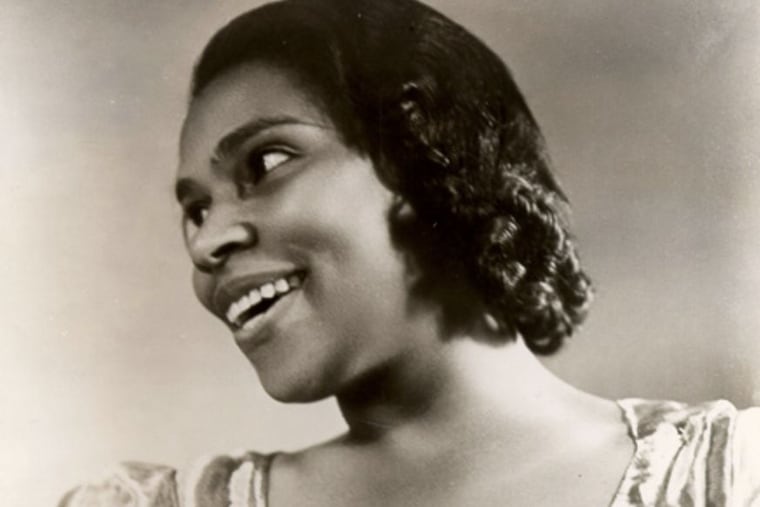‘Oh, my gosh! Why didn’t I know about this growing up?’ Maker of new Marian Anderson film brings it home to Philly for a world premiere
'Once in a Hundred Years: The Life and Legacy of Marian Anderson' has its world premiere at the Kimmel Center Saturday.

The voice was like no other sound before or since, seeming to come out of the depths of the earth with knowledge of elemental truths.
Other great African American singers stood alongside Philadelphia-born Marian Anderson in the 1930s, but she was the one who made doors open — as documented in the new film Once in a Hundred Years: The Life and Legacy of Marian Anderson. Its premiere screening is at 7:30 p.m. Feb. 23 at the Kimmel Center.
“Her story was new to me. And, oh, my gosh, it’s groundbreaking. Why didn’t I know about this growing up? Why haven’t I seen this?” said filmmaker Bill Nicoletti, president of Visual Innovations, which produced the film. "My hope was to have a chance to tell this story while there’s some relevance.”
Anderson (1897-1993) remains a Philadelphia presence — though a circumscribed one — with the Marian Anderson Award given annually at Kimmel Center galas to celebrate singers and all manner of humanitarians.
The award organization also aided Nicoletti in landing key interviews with Anderson biographers and relatives in a world where living memory of the great singer was fading, and quickly.
One might wonder, for example, why conductor James DePreist (Anderson’s nephew, and the relative she went to live with in her final year) isn’t in the film. He died in 2013.
Even the most compelling event of her career — her 1939 concert at the Lincoln Memorial in Washington after she was banned from Constitution Hall on the basis of race — comes with some revelations on film. Knowing about the concert is one thing, but seeing the vast audience of 75,000 at the Lincoln Memorial is another.
The Nicoletti film has seasoned Anderson watchers interpreting it: Stepping up to the microphone, she coped with the enormity of the situation by closing her eyes when beginning to sing “My country 'tis of thee, sweet land of liberty …”
Also interesting are the security measures: The Washington police force formed tight, protective lines around Anderson.
Her Metropolitan Opera debut — the last great musical barrier she crossed — was in 1955 when she was 58. She sang concerts for 10 more years and remained a presence, appearing as the narrator of Aaron Copland’s A Lincoln Portrait during one of the Philadelphia Orchestra’s summer seasons in Saratoga Springs, N.Y.
It is often said that every great performer infuses a particular word with extraordinary meaning. With Anderson, it’s hallelu, the shortened, more exclamatory version of “hallelujah.”
“The most important thing was to tell the story and not alienate people who don’t like opera or classical music,” said Nicoletti. “I wanted to tell the human story.”
That also explains why the only major operatic name in the film is Florence Quivar, the Philadelphia-born mezzo-soprano who received a scholarship in Anderson’s name. Other singers on camera are up-and-comers — some of whom only recently realized they owe their opportunities, however distantly, to Anderson.
“I really wanted to have different vantage points, including educators. The Union Baptist Church [which crowd-sourced some of Anderson’s education] opened a whole door … and I wanted to have people who knew her,” said Nicoletti.
That last priority delivered rare glimpses of Anderson beyond her dignified stage presence, starting with her radiant smile.
Her own words are quoted in an account of standing in line for a music school application, being told, “We don’t accept colored,” and comparing the feeling to a kick in the stomach.
Then there’s her description of prejudice: “Sometimes it’s like a hair across your cheek. You can’t see it. You can’t find it with your fingers, but you keep brushing at it because the feeling of it is irritating.”
Later, Anderson wasn’t modest about enjoying the fruits of her fame. One friend recalls how she employed a chauffeur and battery of servants who were all white.
Though her voice was an extraordinary instrument, from which Nicoletti’s film takes its title, the film reveals her as being a word-centric singer, and in a variety of foreign languages that she learned in the 1930s while making her career in Europe.
The famous Anderson sound was there to serve the words.
“Each song has its own completely distinct profile,” Academy of Vocal Arts faculty member Thor Eckert says in the movie in a detailed analysis of what made Anderson a great singer.
She has a kind of formality that was common among singers in the 1930s and ‘40s but that can be a barrier to modern listeners. Seeing her on screen more readily reveals the artistry behind those meticulously rolled R’s.
WORLD PREMIERE
Once in a Hundred Years: The Life and Legacy of Marian Anderson
7:30 p.m. Feb. 23 at the Kimmel Center’s Perelman Theater. Tickets: $10. Information: 215-893-1999 or kimmelcenter.org.